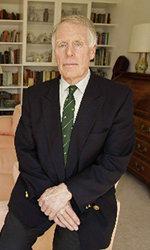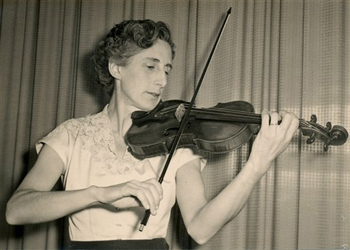Violin lost on train: Wake-up call for us all?
As the 12:18 from Paddington pulled in
 to the Great Bedwyn station on Tuesday, January 29, 2008, Rob Napier, 67, gathered his coat and briefcase as usual and prepared to disembark. Only when Rob was on the footbridge and the train was pulling away did he remember the violin he had left on the luggage rack above his seat. And not just any violin: it was fashioned in 1698 by the Venetian master craftsman Matteo Goffriller. Its bow, made by Eugene Sartory of Paris, had been in Rob’s family for more than a century.
to the Great Bedwyn station on Tuesday, January 29, 2008, Rob Napier, 67, gathered his coat and briefcase as usual and prepared to disembark. Only when Rob was on the footbridge and the train was pulling away did he remember the violin he had left on the luggage rack above his seat. And not just any violin: it was fashioned in 1698 by the Venetian master craftsman Matteo Goffriller. Its bow, made by Eugene Sartory of Paris, had been in Rob’s family for more than a century.Rob explained: “It was the first time I had been on one of the new, fast trains to Bedwyn, and as I got off I was just thinking about the train and whether it would fit on the platform. I just wasn't thinking about the violin. I half thought of jumping over the bridge on the roof of the train, but thought better of it.” Rob immediately alerted the staff of the railway’s lost property office, who telephoned ahead to Taunton, the next stop. A search there revealed the violin was already gone.
 Violin had a history
Violin had a historyRob, his two brothers, and two sisters inherited the valuable instrument from their mother, Elizabeth Hunt, who died in 2006 at age 93. As a professional violinist, she had been a member in the 1930s and 1940s of the well-known all-female Ebsworth String Quartet. She had purchased the instrument in 1945 because she wanted an instrument matching the quality used by her colleagues. Elizabeth took the Goffriller with her on trips to India, Africa, and Germany.
Normalcy was costly
Rob had just retrieved the violin from a London expert who had valued the instrument at £180,000 (about $390,000 or €225,000). As he got on the train for the 70-mile (115-km) journey, Rob explained, “I put it on the luggage rack above my seat. I thought I couldn’t possibly forget it, and I didn’t want to appear different. I was trying to behave normally. I’m not a particularly forgetful person.”
“It was one of those terrible moments when I realised, as the train was steaming off, that I had left it on the train,” Rob said. “I think you can imagine the awful, kind of pit-in-your-stomach feeling.”
The frantic, futile search
“We went hunting for it,” Rob continued. “My wife and I drove through all the stations and left notices for it, and my sister and my cousin did the whole journey on the train the next day, but time has gone by and nothing's happened. My brothers and sisters have been very understanding, but that doesn't hide the disappointment."
Taking a new approach
After months of discrete inquiries, many phone calls, and much correspondence, the violin is still missing. That’s why Rob and the insurance company, Allianz, decided to go public, offering a £10,000 reward (about $20,000 or €12,000) for the return of the violin, even though they risk alerting the thief to its real value.
“The chances are that somebody has it without realising quite what it is,” Rob said. “We just want it back. Quite aside from its value, it has tremendous sentimental value.” Rob was about to lend it to his cousin, Libby Wallfisch, also a professional musician.
“It is very sad,” said Rob’s wife Clare. “In fact, it’s a disaster. We are just praying it turns up.”
Can you relate?
Put yourself on that train as the countryside whizzes past at more than 100 miles per hour. You sit down focused on your mission of getting the prized violin back home to Kingsbury Street, Marlborough. You try to act normal, though you are very nervous, hoping no one is watching and plotting to steal it. You look around. No one seems to take any notice of you or the battered violin case on the rack above you. You open The Times and begin to read. The vibration of the speeding train lulls you into a stupor, just like the commutes you have done for years and years. You turn the page. Oh, this looks interesting, you tell yourself. By the time the train begins to slow to a stop, you are mentally asleep, prisoner to your travel routine, forgetting what made this journey special. You pick up your briefcase and coat, and step onto the platform, eager to get to your auto.
This incident prompts me to wonder what other valuable things we let slip through our hands through inattention or neglect.
Losing your valuables
Here is your spouse, your companion through triumph and trial, with
 whom you have not had an evening’s conversation in weeks. There are your two kids, who seldom get your full attention, even when they address you directly and passionately. Your Bible (now, where is it, again?) you have set aside, though you are a voracious reader. Your reputation, your integrity, and your values are all strewn here and there around you. Your spirituality, which seemed so promising and enriching when it was young, you toss onto the overhead rack as you settle into your seat. All the while, the train of your life shakes and rattles you into a stupor, as it streaks toward eternity. You yawn. Your routine is giving you amnesia to what is precious.
whom you have not had an evening’s conversation in weeks. There are your two kids, who seldom get your full attention, even when they address you directly and passionately. Your Bible (now, where is it, again?) you have set aside, though you are a voracious reader. Your reputation, your integrity, and your values are all strewn here and there around you. Your spirituality, which seemed so promising and enriching when it was young, you toss onto the overhead rack as you settle into your seat. All the while, the train of your life shakes and rattles you into a stupor, as it streaks toward eternity. You yawn. Your routine is giving you amnesia to what is precious.Make your own list. What is priceless but neglected in your life? What would you spend the rest of your days trying to regain if you let it slip away due to careless inattention?
Preventable tragedy
How differently the story would have ended if Rob had placed the violin case in his lap instead of on the luggage rack! What’s the lesson for us? Stay in constant contact with whatever you value. Spend time conversing with your spouse every day. Get down on the level of your kids, and stop the multi-tasking. Devote yourself to reading, reflecting on, memorizing, and sharing the Scriptures regularly. Evaluate you reputation, assess your integrity, explore and refine your values constantly. Take time to invest in your spiritual life, every day. Keep in constant contact with what is precious to you. Don’t let anyone or anything steal them away.
The biblical warning is clear: “We must pay more careful attention, therefore, to what we have heard, so that we do not drift away…. How shall we escape if we ignore such a great salvation?” (Hebrews 2:1, 3).
Want to go deeper?
Here are some passages to look at regarding "watching" and "guarding":
- Neglect: Psalm 119:16; Matthew 23:23, par. Luke 11:42; Acts 6:2; 1 Timothy 4:14.
- Staying spiritually awake and paying attention: Matthew 25:13, par. Mark 13:33, 35, 37 & Luke 21:36; 26:41, par. Mark 14:34, 37, 38; Acts 20:31; Romans 13:11; 1 Corinthians 16:13; Ephesians 5:8-17; 6:18; Colossians 4:2; 1 Thessalonians 5:1-8; 2 Timothy 4:5; Hebrews 13:17; 1 Peter 4:7; 2 John 1:8; Revelation 3:1-3; 16:15.
Recommended for purchase:
Victor E. Frankl. Man's Search for Meaning (Rev. ed., 2000) – Between 1942 and 1945 psychiatrist Viktor Frankl labored in four different camps, including Auschwitz, while his parents, brother, and pregnant wife perished. Based on his own experience and the stories of his many patients, he argues that we cannot avoid suffering but we can choose how to cope with it, find meaning in it, and move forward with renewed purpose. He outlines his resulting unique method of therapy, known as "Logotherapy," designed to help subjects to discover what is their purpose for living.
Note: A quick survey of the following two books tells me they have forms you can use to keep up with how you are doing spiritually. As always, I don't necessarily recommend everything they teach. Part of "going deeper" is developing your own spiritual discernment.
Craig Groeschel. Chazown: A Different Way to See Your Life (2006) – Packed with storytelling, graphics, in-your-face honesty, bite-sized chapterettes, step-by-step guidance, surprising self-assessments, and irresistable energy in a fast-paced style that will drive you forward with purpose.
Rick Warren. The Purpose-Driven Life Journal (2003) – Featuring quotes from The Purpose Driven Life, space to record your daily prayers, and a host of inspiring Scripture readings. Each of the journal's five sections ends with a topical "spiritual health assessment" to encourage you onward towards a life of purpose.
Online Resources:
Harold G. Koenig, M.D. "Spiritual Assessment in Medical Practice" (2001)
Gowri Anandaraja, M.D., & Ellen Hight, M.D. "Spirituality and Medical Practice: Using the HOPE Questions as a Practical Tool for Spiritual Assessment" (2001)
As inadequate as these are from a biblical perspective, they at least provide a starting place for spiritual self-assessment. See 2 Corinthians 13:5.
Labels: spiritual assessment, spiritual priorities, spiritual vigilance, spirituality, watchfulness
» Post a Comment